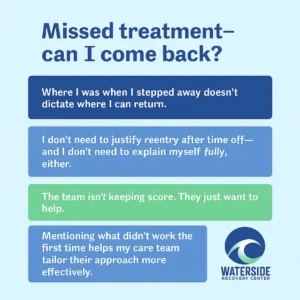You missed a few days. Then a week. Maybe longer. And now you don’t know what to say—or if you’re even “allowed” to come back.
Maybe something specific pulled you away. A life event. A work issue. Family pressure. Maybe nothing “happened”—you just hit that wall that quietly whispers, “This isn’t working,” or “I’ll go tomorrow,” until tomorrow doesn’t come.
Now you’re sitting with a mix of guilt, hesitation, maybe even some hope. And you’re wondering: Can I really just… come back?
Yes, you can.
At Waterside Recovery’s outpatient treatment program, we’ve seen this more times than you might think. People stepping away mid-treatment. People ghosting a group after one hard session. People going silent, not because they didn’t care—but because showing up got complicated.
This blog is for you—the one who left early and is now wondering how to come back without feeling like you’ve failed. You haven’t. And this guide will help you take that next step, one honest moment at a time.
Start Where You Are—Not Where You Left Off
Let’s get one thing clear: you don’t need to pick up exactly where you left off. That version of you is not the only version that deserves care.
Maybe you were three weeks in. Maybe you had just started. Wherever you were in the program when you left, that doesn’t have to dictate where you go now.
Coming back to treatment after time away isn’t about “making up for lost time.” It’s about reconnecting from where you are right now—mentally, emotionally, practically. That’s all any care team wants to know: Where are you today?
You Don’t Need a Perfect Reason to Reconnect
One of the biggest barriers to reaching out again is feeling like you need a solid, justifiable reason for why you left.
You don’t.
Life is messy. Mental health is hard. Substance use can complicate everything. Shame has a sneaky way of convincing you that unless you have a spreadsheet of reasons, your reentry won’t be taken seriously.
The truth? Most people don’t leave because they don’t care. They leave because:
- They got overwhelmed
- They didn’t feel ready
- They were too anxious to keep going
- Something big happened and threw them off course
- It felt too vulnerable, too fast
You don’t need to justify stepping away to be welcome back.
What to Say When You’re Not Sure What to Say
If the idea of calling or emailing your care team feels awkward, know that it’s okay to start small.
You can literally say:
- “I stepped away and I’d like to talk about coming back.”
- “I’m not sure how this works, but I want help again.”
- “I left early and I’m nervous to reach out—but I’m here.”
No long explanation. No apology tour. Just your voice—and a little bit of courage. We’ll meet you there.
Ask About Options—Not Obligations
Many people assume that rejoining an outpatient treatment program means jumping back into the exact same setup: same therapist, same schedule, same expectations.
But that’s not always the case. You’re allowed to ask for adjustments.
Try saying:
- “What would it look like to restart?”
- “Is there a way to ease back in?”
- “Could we talk through what’s changed since I left?”
You might be surprised at how flexible the path forward can be. Maybe you join a new group. Maybe you return part-time. Maybe you pick one piece—like individual therapy—and see how that feels first.
At Waterside Recovery, we want the program to fit your life—not feel like another impossible demand.
Your Care Team Isn’t Keeping Score
If you’re imagining your discharge paperwork with bold red letters—“NONCOMPLIANT,” “DROPPED OUT,” “UNRELIABLE”—let’s clear that image right now.
Your care team isn’t keeping score. They’re not disappointed in you. They’re not gossiping about your exit. They’re not waiting with crossed arms.
Most likely? They’re hoping you’ll reach out. And they’ll be glad when you do.
People pause treatment all the time. What matters isn’t that you left—it’s that you’re still considering care.
Be Honest About What Didn’t Work (It Helps)
Coming back to care is a great opportunity to speak honestly about what wasn’t working for you the first time around.
That group felt too big? Say it.
You weren’t ready for trauma processing? Totally valid.
Even something like “I felt rushed,” or “It was hard to talk in the setting” gives your care team valuable insight. It helps them shape a better fit this time around.
Recovery isn’t about “powering through.” It’s about finding what actually supports you—and sometimes, that means trying again differently.
One Call Doesn’t Mean You’re Committed for Life
Worried that making contact means signing up for another full schedule, another intake, another commitment you’re not ready for?
You’re not alone.
Let’s ease that pressure: You’re allowed to call just to ask questions. You can dip your toe in. You can say, “I’m not sure yet, but I’d like to talk.”
At Waterside Recovery, we welcome curiosity, hesitation, and uncertainty. You don’t have to be ready to finish the whole program. You just have to be ready to start the next conversation.
Coming Back Isn’t Failure—It’s Wisdom
There’s a version of you that might say: “I messed up.” “I couldn’t stick with it.” “Why would they even want me back?”
But here’s what we see: someone who knows enough to come back.
That’s not failure. That’s wisdom. That’s resilience. That’s choosing healing again—even when it’s complicated.
No one walks a perfectly straight path through treatment. Sometimes, it takes leaving to know what you needed. Sometimes, returning is the most powerful thing you can do.
Looking for an Outpatient Treatment Program in Bristol County, MA?
Frequently Asked Questions About Returning to Outpatient Treatment
Is it normal to leave treatment and come back?
Yes. It happens more often than people think. Life can interrupt even the best intentions. Most programs, including ours, expect that some clients will pause and return later.
Will I have to start all over?
Not always. It depends on how long you were away and what parts of the program you completed. Many clients are able to resume with adjustments or begin a modified schedule that works better.
Do I need a referral or re-evaluation?
You may need a quick re-assessment, but it’s nothing to fear. It’s mostly to see how you’re doing now and what support would serve you best going forward. No judgment, no pressure.
What if I’m embarrassed?
You’re not alone in that feeling. But we promise: no one will shame you. The team’s focus is on care, not critique. We’re just glad you’re thinking about trying again.
Can I change therapists or group settings?
Yes. If something didn’t feel right the first time, let us know. We want you to feel supported. That might mean changing therapists, joining a different group, or trying a new modality altogether.
What if I’m still not sure I’m ready?
That’s okay. Readiness isn’t a switch—it’s a process. You can reach out just to explore your options. You don’t have to be fully sure to take a small step.
Ready to Reconnect?
You don’t have to explain everything. You don’t have to apologize. You just have to reach out.
Call (866)671-8620 or visit our Outpatient Treatment Program page to learn how Waterside Recovery welcomes you back—with open hands and no judgment.
You didn’t ruin your chance. You’re just beginning again—and that matters more than anything.



